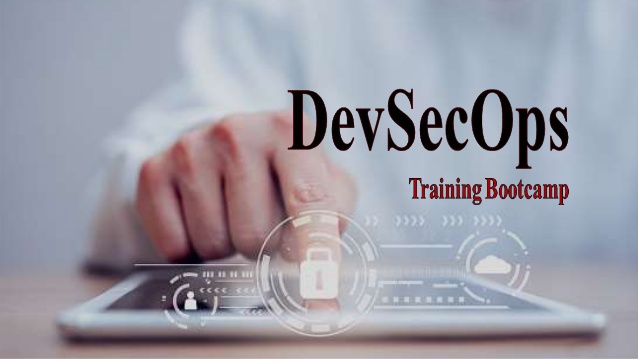DevSecOps Training Bootcamp, Acquire In-depth Knowledge And Skills
DevSecOps Training Bootcamp, Acquire In-depth Knowledge And Skills
The goal of DevSecOps (development, security, and operations) is to make everyone responsible for security, with the main target on implementing security decisions and actions at an equivalent scale and speed as development and operations decisions and actions.
Some people will say that this is not just about development, security and operations. This is a very important mentality that led to the emergence of the term "DevSecOps" to emphasize the need to establish a security foundation in the DevOps plan.
Implementing DevSecOps are often an elaborate process for a corporation , but well worthwhile when considering the advantages .
Implementation usually includes the subsequent stages:
- Planning and development
- Building and testing
- Deployment and operation
- Monitoring and scaling
Discovered early vulnerabilities in SDLC has tremendous impact on overall security as well as the costs to fix issues.
Also, multiple teams coming together to work on security improves accountability. Such collaboration also facilitates coming up with quick and effective security response strategies and more robust security design patterns.
A more important benefit is that DevSecOps provides managers with a general overview of such measures, thereby providing a better framework for better compliance with regulations such as the General Data Protection Regulation (GDPR).
The DevSecOps program needs continuous improvement to realize the specified efficiency.
Logical principles that ought to be followed within the implementation of DevSecOps include:
- Implement strict access security on API endpoints.
- The automatic test of the safety function is connected to the acceptance test process. These automated tests include input verification as well as identity verification and authorization implementation.
- Continuously monitor, audit and remediate security defects throughout the application life cycle.
- Automated security updates, such as patches for known vulnerabilities, by means of the DevOps pipeline with an audit log.
- Automated service configuration management, allowing for compliance with security policies and the elimination of manual errors.
- Scanning any pre-built container images for known security vulnerabilities as they are pulled into the build pipeline.
Tonex's DevSecOps Training Bootcamp
DevSecOps training Bootcamp is a practical DevSecOps course, participants can acquire in-depth knowledge and skills to apply, implement and improve IT security in modern DevOps.
Participants understand DevOps and DevSecOps to take full advantage of the agility and responsiveness of the secure DevOps method, IT security on SDLC, and the entire life cycle of the application.
DevSecOps Training Bootcamp focuses on:
- Concepts
- Principles
- Processes
- Policies
- Guidelines
- Mitigation
- Applied Risk Management Framework (RMF)
- Technical Skills
- Apply Security and Risk Management/Profiling a DevOps Priority
As IT Modernization efforts Grow it’s important to understand the combination of development and operations as an approach that could help organizations modernize and speed new development efforts, especially as they migrate to cloud services.
Effective DevOps can ensure rapid and frequent development cycles, but inappropriate and outdated security practices and strategies may even cancel the most effective DevOps plan.
DevSecOps is the integration of DevOps and security. This is a shared responsibility, emphasizing that a security foundation must be established in the DevOps plan.
Audience:
- Security Staff
- IT Leadership
- IT Infrastructure
- CIOs / CTOs /CSO
- Configuration Managers
- Developers and Application Team Members and Leads
- IT Operations Staff
- IT Project & Program Managers
- Product Owners and Managers
- Release Engineers
- Agile Staff and ScrumMasters
- Software Developers
- Software Team Leads
- System Admin
Training Objectives:
- Identify and explain the phases of the DevOps life cycle
- Define the roles and responsibilities that support the DevOps environment
- Describe the security components of DevOps and determine its risk principles
- Analyze, evaluate and automate DevOps application security across SDLC
- Identify and explain the characteristics required to meet the definition of DevOps computing security
- Discuss strategies for maintaining DevOps methods
- Perform gap analysis between DevOps security benchmarks and industry standard best practices
- Evaluate and implement the safety controls necessary to make sure confidentiality, integrity and availability (CIA) in DevOps environments
- Perform risk assessments of existing and proposed DevOps environments
- Integrate RMF with DevOps
- Explain the role of encryption in protecting data and specific strategies for key management
- Use DevOps-style security metrics to measure and monitor security practices and performance
- Distinguish various security models and frameworks integrated into the DevOps environment
- SDLC security in standard DevOps environment, comparison of technical use cases and software requirements
- Explain strategies for protecting data at rest and motion
Course Content:
- DevOps vs. DevSecOps
- DevOps Security Requirements
- DevOps Typical Security Activities
- Tools for Securing DevOps
- Principles Behind DevSecOps
- DevSecOps and Application Security
- How to DevSecOps
- DevSecOps Maturity
- RMF, DevOps and DevSecOps
Workshops and Group Activities:
- Workshop 1: Plan for DevSecOps
- Workshop 2: Secure Code Overview
- Workshop 3: Create a DevSecOps plan
For More Information:
DevSecOps Training Bootcamp




Comments
Post a Comment